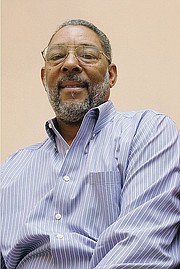Contractors claim they are left out of city lead removal contracts
Jeremy M. Lazarus | 12/28/2018, 6 a.m.
Small African-American contractors like Anson Bell and Nathan Beyah claim they are being locked out of work to remove from 150 Richmond homes and apartments toxic lead paint that yearly damages the developing brains of dozens of young children.
Since receiving a three-year, $2.71 million federal grant in June 2017 to pay for encapsulating or removing lead paint from windows and interior and exterior walls, City Hall and the Richmond City Health District have failed to hold classes to certify owners and workers in lead paint containment and removal.
According to Mr. Beyah, that has allowed project:Homes, a 26-year-old nonprofit that the city and the health district subcontracted with to run the lead paint abatement effort, to limit the work to three companies, two of which Mr. Beyah alleges employ people who are not certified to work on lead abatement. Both are minority-owned companies.
The third, Blake Construction, is a large, majority-owned company that Mr. Beyah said is getting most of the work, which involves contracts of $5,000 to $10,000 per residence, an ideal size Mr. Beyah said for small companies.
The Free Press contacted Daniel Mouer, City Hall’s point person on the lead paint program, Dr. Danny Avula, director of the Richmond City Health District that is operating the program for the city, and Zack Miller, who runs the lead paint program for project:Homes about Mr. Beyah’s allegation on the lack of training.
Mr. Mouer said he needed more time to respond; Dr. Avula referred questions to Mr. Mouer; and Mr. Miller did not respond.
A search found no evidence that City Hall, the Health District or project:Homes has announced dates or times for certification training for workers or contractors.
The grant that the city and its health district received is the first in 13 years that the U.S. Department of Housing and Urban Development has awarded to the city for lead paint removal.
In 2004, a nonprofit won the grant after HUD found the city mishandled the money and did not get the work done. Despite being banned in 1978, toxic lead paint is still found in thousands of residences in Richmond and across the country.
Testing finds 30 to 70 children a year in the city who have high, potentially brain-damaging levels of lead in their bloodstream, often from breathing dust with high lead levels or ingesting chips from peeling paint.
In Richmond, the city Health District has played a key role in investigating problem and ensuring children get tested for lead. The district also has sought to work with families, homeowners and landlords when high levels of lead are detected. The grant is designed to help localities cover the cost of improvements to remediate lead.
Mr. Mouer, a city project manager in the Department of Housing and Community Development whom Mayor Levar M. Stoney credited with leading the effort to secure the grant, notified the Free Press last Friday that he would need another week to respond to questions whether untrained workers have been allowed to perform lead abatement by project:Homes.
Separately, the Free Press found that project:Homes had promised to hold such training, funding for which is included in the federal grant, according to HUD. Last April, Mr. Miller included such a promise in an email to Mr. Beyah.
“Starting this fall,” Mr. Miller wrote, “we will be offering a series of lead worker and lead supervisor trainings towards the relevant certifications from DPOR,” the Virginia Department of Professional Occupational Regulation, whose oversight includes contractors.
“These trainings will be offered free of charge supported by the City’s HUD grant. I will let you know details once we set the dates,” Mr. Miller continued.
Mr. Bell, a state-licensed Class A mechanical, electrical and plumbing contractor, said he is disappointed that no classes have been held. He said he had been certified in lead abatement, but his state certifications lapsed.
“I expected there to be training for contractors like myself so we could renew our certification, but it just hasn’t happened,” he said.
Mr. Beyah, who has had extensive experience in overseeing and removing lead, mold and asbestos and currently operates a licensed Class A residential contractor business called New Industries, also expected training to be offered so he could renew his lead abatement licenses and compete for contracts.
When the training never materialized, “I became impatient and attempted on many occasions to get training on my own,” he stated. But trainers around the state “could not put on the classes because there were not enough interested students,” he said. “That’s one of the many reasons HUD includes training as a part of the grant,” he stated.
In the past 40 years, “I have been involved in at least six lead grant programs, and the reason the training is included is because HUD knows that because of the often long time lapses between grants, most contractors’ certification expires.”
Mr. Beyah noted that “small minority companies are often criticized for not having the experience or qualifications as the reason for not obtaining contracts.”
In this case, the failure to offer training classes ensures that small companies like his cannot compete, making it “a great example of discrimination,” he said.







